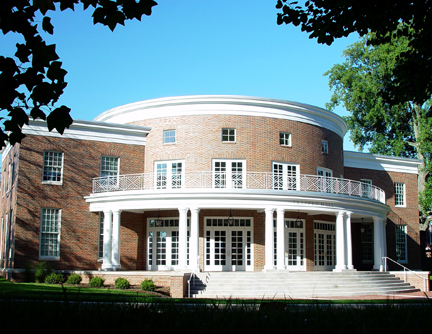 Trippet Hall is home to the Center of Inquiry in the Liberal Arts |
The conference, sponsored by the Center of Inquiry in the Liberal Arts at Wabash College, also aims to get a handle on the exact extent to which medical school admission deans favor applicants with a liberal arts background. Small colleges have long touted their ability to prepare students for the rigors of medical school as being one of their major advantages over large, research-based universities.
Admissions deans slated to attend include Gerry Foster of Harvard, Beth Bailey of Virginia, Andy Frantz at Columbia, Liliana Montano at Cornell, Harold Friedman of Dartmouth, Lloyd Michael of Baylor and Robert Sabalis, of the American Association of Medical Colleges office of Student Programs.
"Everybody who I called wanted to come, and most committed on the spot," says Michael McGrath, a retired chemistry professor from Holy Cross College in Worcester, Mass., who also served as that college's pre-med advisor for about 30 years. "These are people who are very committed to getting the right people in medical school, and they believe it's important to get well-rounded, empathetic people into the field of medicine."
The topics to be discussed at the conference, which will take place December 13 and 14, include:
-- Do medical schools prefer candidates with a liberal arts background? If so, why?
-- How do medical schools perceive non-science majors. Do non-science majors bring any special skills or insight to medicine?
-- Are there differences between a science major from a liberal arts college and one from a university? Are there advantages to the former?
-- Are there differences in the way that sciences are taught in a liberal arts college rather than at a university? If so, which has the advantage?
-- What are the factors in a liberal arts education that make a difference in medical school students and eventual physicians?
The conference comes against the backdrop of applications to medical school dropping for the sixth year in a row. McGrath said he's not especially worried about that statistic, because for him, the applicant pool should be more about quality than quantity. Still, he concedes it's important for the field to continue attracting high-quality applicants who want to be healers.
"I think there's always a crisis, because we're always trying to find good people for medical schools," McGrath says. "Being a doctor is more than passing objective tests; if it came to that we're all in trouble. That's where the liberal arts experience comes in."
For more information, contact: Michael G. McGrath, coordinator of inquiries at the Center of Inquiry in the Liberal Arts at Wabash College (814-336-2480; mcgrathm@wabash.edu) or Jim Amidon, director of public affairs and marketing at Wabash (amidonj@wabash.edu; 765-361-6364).
For more information see: